Sociology of Health LC459: Examining Illness as a Form of Deviance
VerifiedAdded on 2023/06/18
|8
|2024
|334
Essay
AI Summary
This essay explores the sociological perspectives on illness as a form of deviance, drawing upon the work of Talcott Parsons and other theorists. It examines the functionalist perspective, which views illness as disruptive to societal functions and necessitating the 'sick role' with its associated rights and obligations. The interactionist perspective is also discussed, highlighting how meanings of health and illness are socially constructed through interactions. Furthermore, the essay delves into the labeling approach, which posits that societal reactions and labeling contribute to the manifestation of mental illness. The essay concludes that the understanding of illness has evolved over time, with society increasingly recognizing it as a complex phenomenon shaped by social, cultural, and individual factors. Desklib provides a platform for students to access similar essays and study materials.
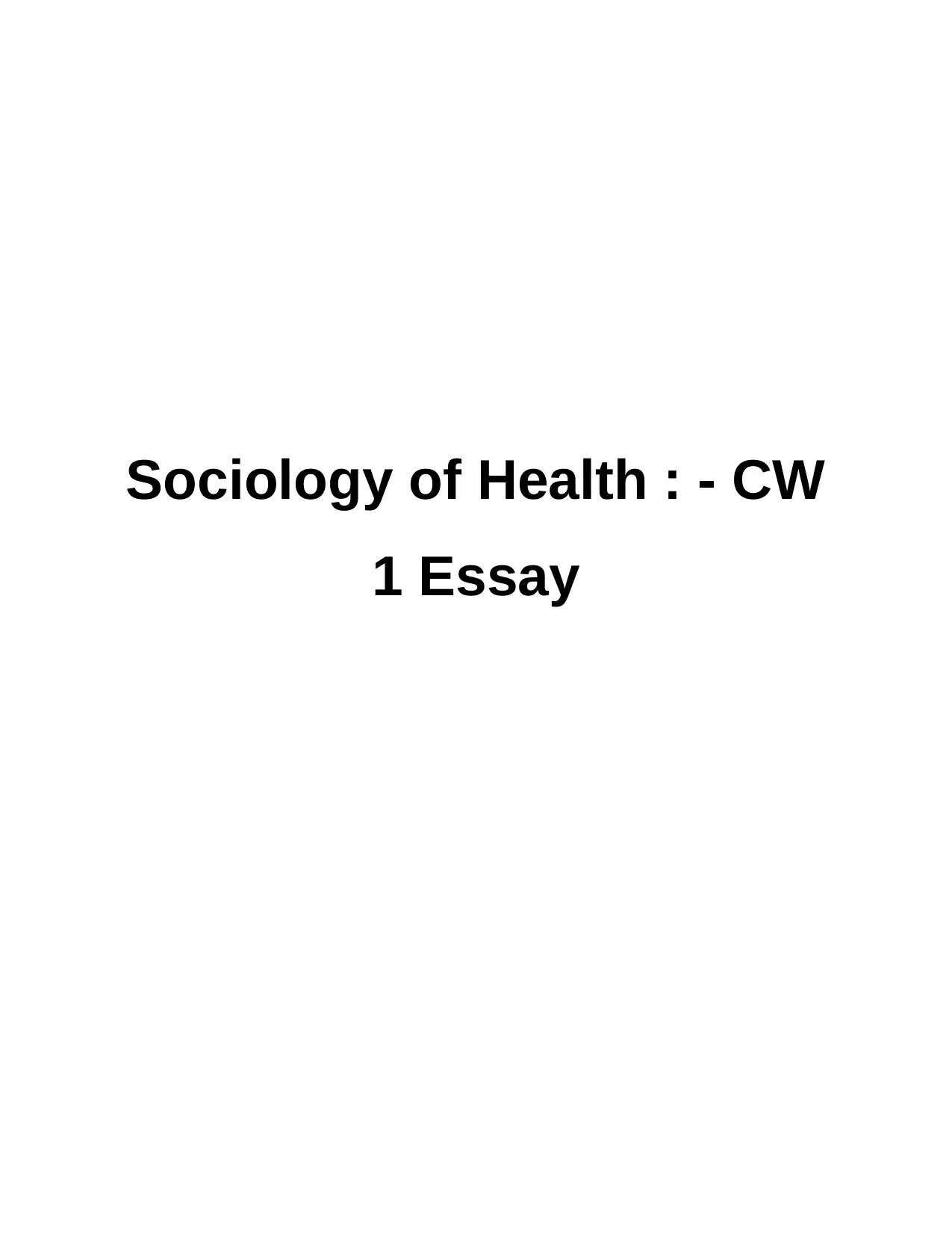
Sociology of Health : - CW
1 Essay
1 Essay
Paraphrase This Document
Need a fresh take? Get an instant paraphrase of this document with our AI Paraphraser
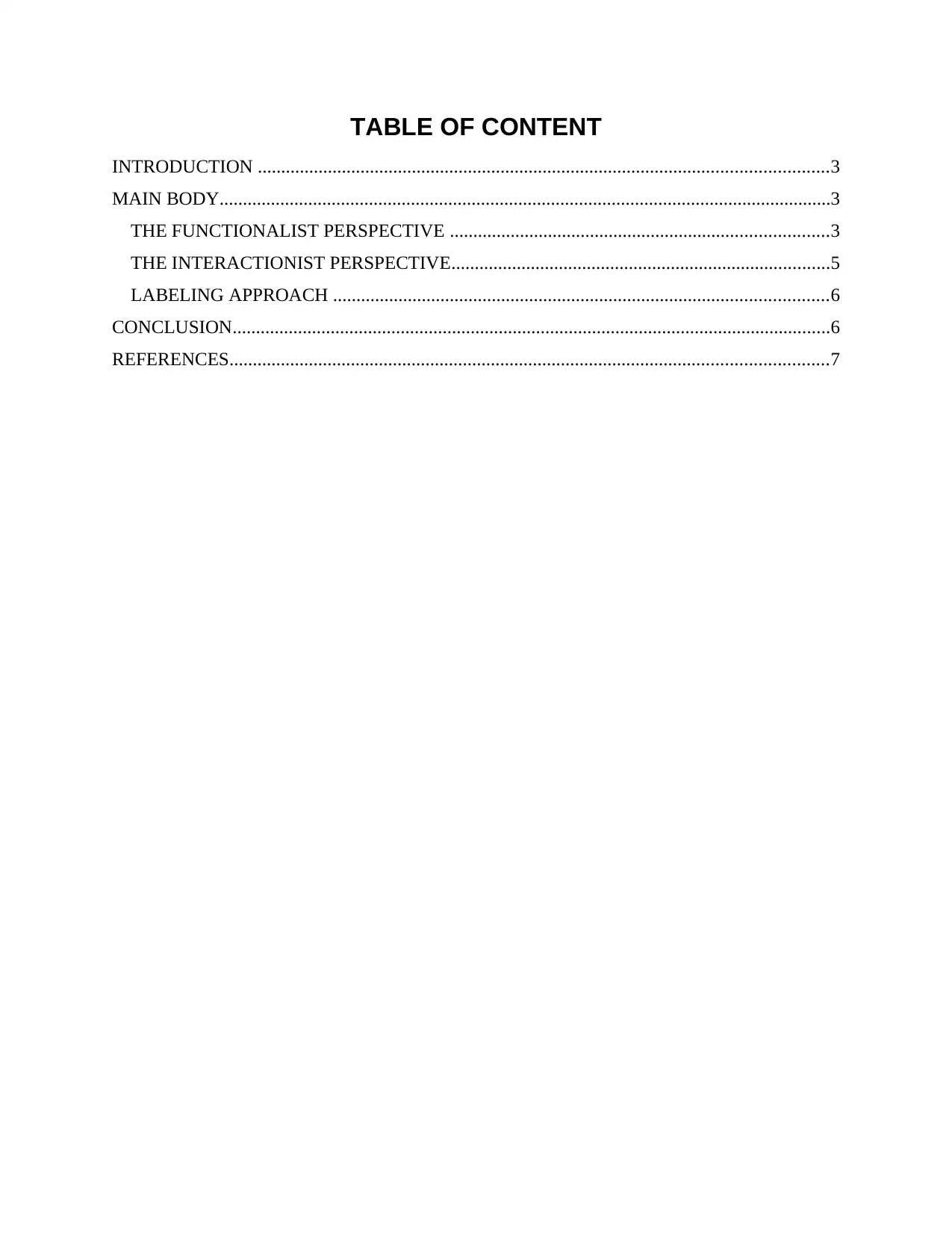
TABLE OF CONTENT
INTRODUCTION ..........................................................................................................................3
MAIN BODY...................................................................................................................................3
THE FUNCTIONALIST PERSPECTIVE .................................................................................3
THE INTERACTIONIST PERSPECTIVE.................................................................................5
LABELING APPROACH ..........................................................................................................6
CONCLUSION................................................................................................................................6
REFERENCES................................................................................................................................7
INTRODUCTION ..........................................................................................................................3
MAIN BODY...................................................................................................................................3
THE FUNCTIONALIST PERSPECTIVE .................................................................................3
THE INTERACTIONIST PERSPECTIVE.................................................................................5
LABELING APPROACH ..........................................................................................................6
CONCLUSION................................................................................................................................6
REFERENCES................................................................................................................................7
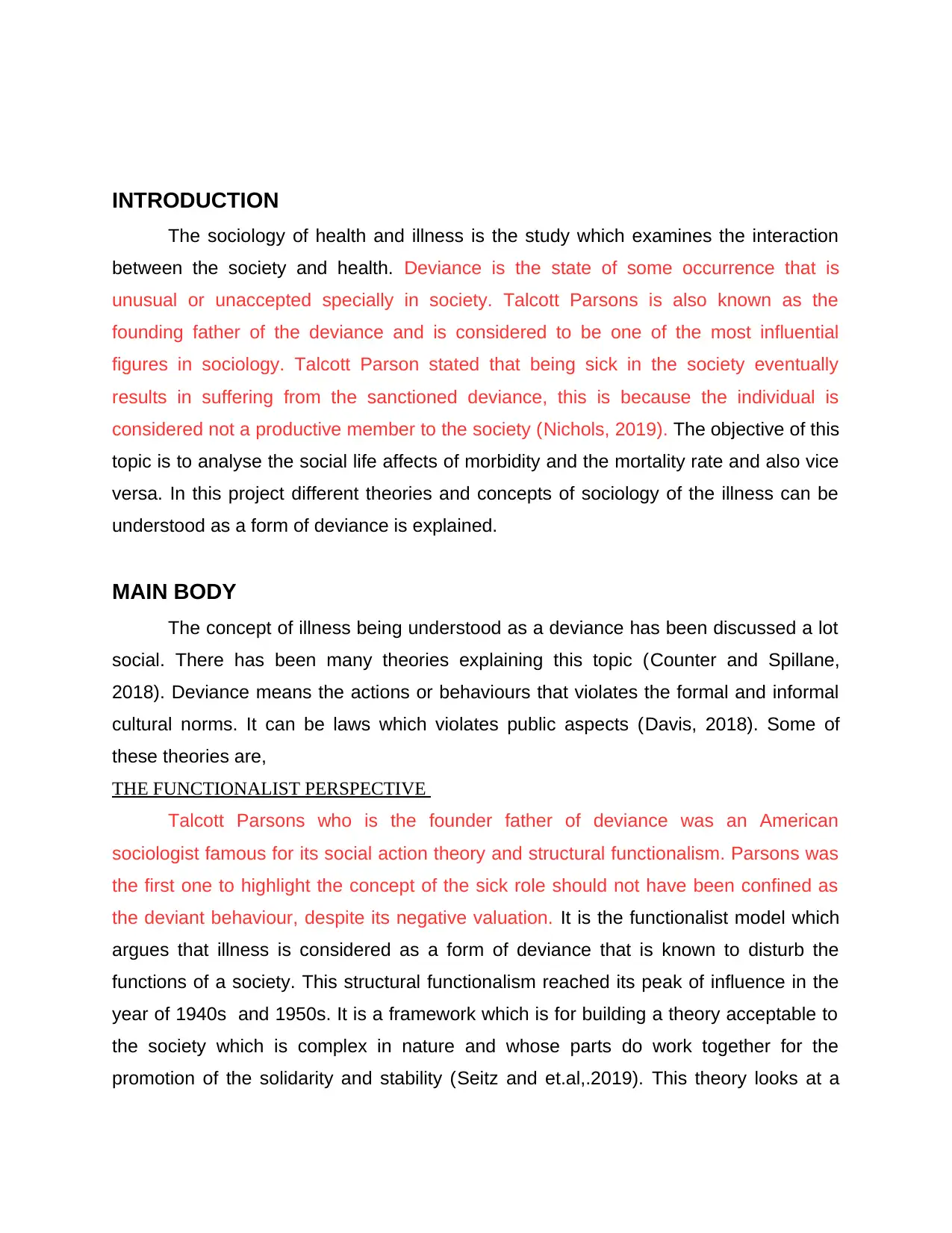
INTRODUCTION
The sociology of health and illness is the study which examines the interaction
between the society and health. Deviance is the state of some occurrence that is
unusual or unaccepted specially in society. Talcott Parsons is also known as the
founding father of the deviance and is considered to be one of the most influential
figures in sociology. Talcott Parson stated that being sick in the society eventually
results in suffering from the sanctioned deviance, this is because the individual is
considered not a productive member to the society (Nichols, 2019). The objective of this
topic is to analyse the social life affects of morbidity and the mortality rate and also vice
versa. In this project different theories and concepts of sociology of the illness can be
understood as a form of deviance is explained.
MAIN BODY
The concept of illness being understood as a deviance has been discussed a lot
social. There has been many theories explaining this topic (Counter and Spillane,
2018). Deviance means the actions or behaviours that violates the formal and informal
cultural norms. It can be laws which violates public aspects (Davis, 2018). Some of
these theories are,
THE FUNCTIONALIST PERSPECTIVE
Talcott Parsons who is the founder father of deviance was an American
sociologist famous for its social action theory and structural functionalism. Parsons was
the first one to highlight the concept of the sick role should not have been confined as
the deviant behaviour, despite its negative valuation. It is the functionalist model which
argues that illness is considered as a form of deviance that is known to disturb the
functions of a society. This structural functionalism reached its peak of influence in the
year of 1940s and 1950s. It is a framework which is for building a theory acceptable to
the society which is complex in nature and whose parts do work together for the
promotion of the solidarity and stability (Seitz and et.al,.2019). This theory looks at a
The sociology of health and illness is the study which examines the interaction
between the society and health. Deviance is the state of some occurrence that is
unusual or unaccepted specially in society. Talcott Parsons is also known as the
founding father of the deviance and is considered to be one of the most influential
figures in sociology. Talcott Parson stated that being sick in the society eventually
results in suffering from the sanctioned deviance, this is because the individual is
considered not a productive member to the society (Nichols, 2019). The objective of this
topic is to analyse the social life affects of morbidity and the mortality rate and also vice
versa. In this project different theories and concepts of sociology of the illness can be
understood as a form of deviance is explained.
MAIN BODY
The concept of illness being understood as a deviance has been discussed a lot
social. There has been many theories explaining this topic (Counter and Spillane,
2018). Deviance means the actions or behaviours that violates the formal and informal
cultural norms. It can be laws which violates public aspects (Davis, 2018). Some of
these theories are,
THE FUNCTIONALIST PERSPECTIVE
Talcott Parsons who is the founder father of deviance was an American
sociologist famous for its social action theory and structural functionalism. Parsons was
the first one to highlight the concept of the sick role should not have been confined as
the deviant behaviour, despite its negative valuation. It is the functionalist model which
argues that illness is considered as a form of deviance that is known to disturb the
functions of a society. This structural functionalism reached its peak of influence in the
year of 1940s and 1950s. It is a framework which is for building a theory acceptable to
the society which is complex in nature and whose parts do work together for the
promotion of the solidarity and stability (Seitz and et.al,.2019). This theory looks at a
⊘ This is a preview!⊘
Do you want full access?
Subscribe today to unlock all pages.

Trusted by 1+ million students worldwide
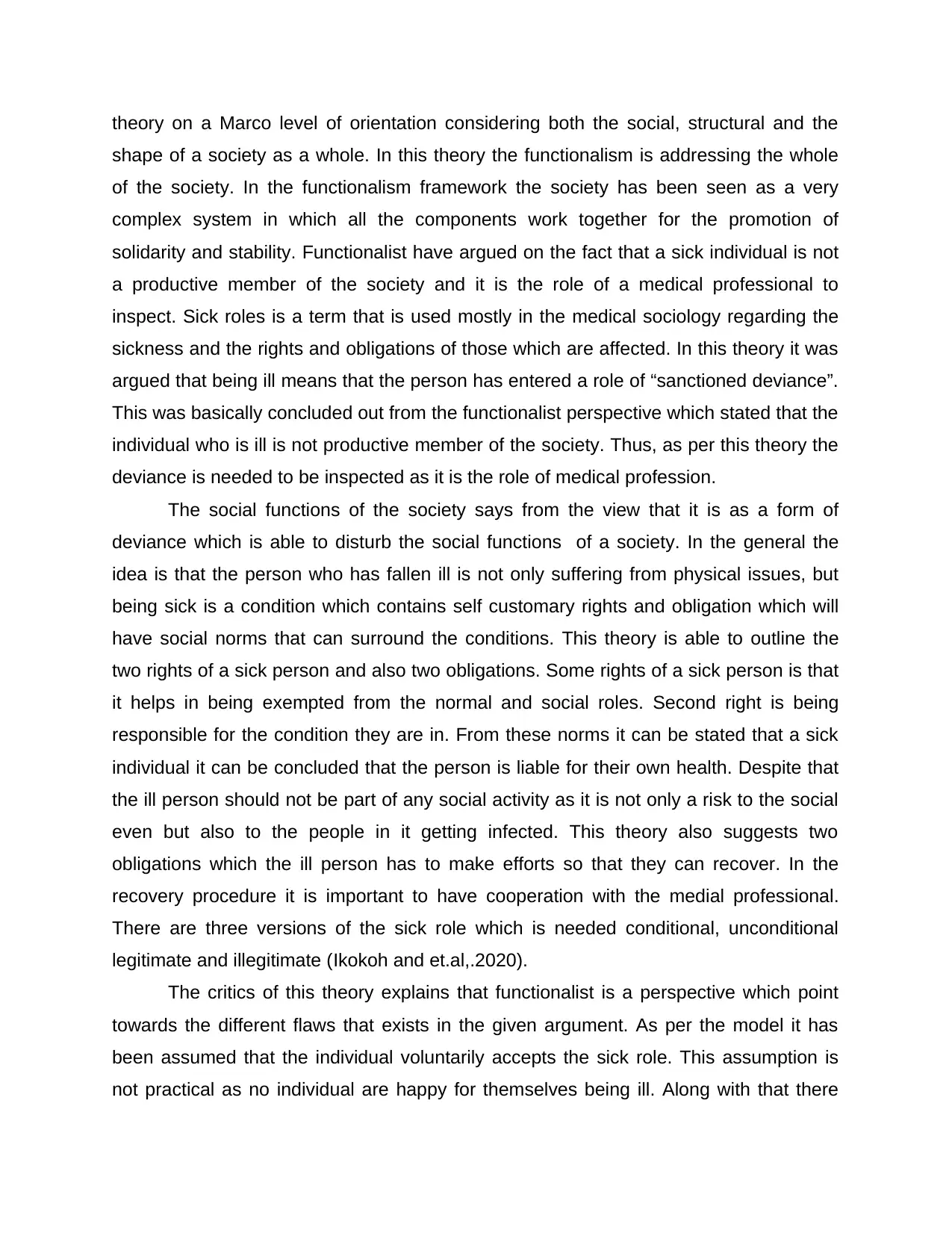
theory on a Marco level of orientation considering both the social, structural and the
shape of a society as a whole. In this theory the functionalism is addressing the whole
of the society. In the functionalism framework the society has been seen as a very
complex system in which all the components work together for the promotion of
solidarity and stability. Functionalist have argued on the fact that a sick individual is not
a productive member of the society and it is the role of a medical professional to
inspect. Sick roles is a term that is used mostly in the medical sociology regarding the
sickness and the rights and obligations of those which are affected. In this theory it was
argued that being ill means that the person has entered a role of “sanctioned deviance”.
This was basically concluded out from the functionalist perspective which stated that the
individual who is ill is not productive member of the society. Thus, as per this theory the
deviance is needed to be inspected as it is the role of medical profession.
The social functions of the society says from the view that it is as a form of
deviance which is able to disturb the social functions of a society. In the general the
idea is that the person who has fallen ill is not only suffering from physical issues, but
being sick is a condition which contains self customary rights and obligation which will
have social norms that can surround the conditions. This theory is able to outline the
two rights of a sick person and also two obligations. Some rights of a sick person is that
it helps in being exempted from the normal and social roles. Second right is being
responsible for the condition they are in. From these norms it can be stated that a sick
individual it can be concluded that the person is liable for their own health. Despite that
the ill person should not be part of any social activity as it is not only a risk to the social
even but also to the people in it getting infected. This theory also suggests two
obligations which the ill person has to make efforts so that they can recover. In the
recovery procedure it is important to have cooperation with the medial professional.
There are three versions of the sick role which is needed conditional, unconditional
legitimate and illegitimate (Ikokoh and et.al,.2020).
The critics of this theory explains that functionalist is a perspective which point
towards the different flaws that exists in the given argument. As per the model it has
been assumed that the individual voluntarily accepts the sick role. This assumption is
not practical as no individual are happy for themselves being ill. Along with that there
shape of a society as a whole. In this theory the functionalism is addressing the whole
of the society. In the functionalism framework the society has been seen as a very
complex system in which all the components work together for the promotion of
solidarity and stability. Functionalist have argued on the fact that a sick individual is not
a productive member of the society and it is the role of a medical professional to
inspect. Sick roles is a term that is used mostly in the medical sociology regarding the
sickness and the rights and obligations of those which are affected. In this theory it was
argued that being ill means that the person has entered a role of “sanctioned deviance”.
This was basically concluded out from the functionalist perspective which stated that the
individual who is ill is not productive member of the society. Thus, as per this theory the
deviance is needed to be inspected as it is the role of medical profession.
The social functions of the society says from the view that it is as a form of
deviance which is able to disturb the social functions of a society. In the general the
idea is that the person who has fallen ill is not only suffering from physical issues, but
being sick is a condition which contains self customary rights and obligation which will
have social norms that can surround the conditions. This theory is able to outline the
two rights of a sick person and also two obligations. Some rights of a sick person is that
it helps in being exempted from the normal and social roles. Second right is being
responsible for the condition they are in. From these norms it can be stated that a sick
individual it can be concluded that the person is liable for their own health. Despite that
the ill person should not be part of any social activity as it is not only a risk to the social
even but also to the people in it getting infected. This theory also suggests two
obligations which the ill person has to make efforts so that they can recover. In the
recovery procedure it is important to have cooperation with the medial professional.
There are three versions of the sick role which is needed conditional, unconditional
legitimate and illegitimate (Ikokoh and et.al,.2020).
The critics of this theory explains that functionalist is a perspective which point
towards the different flaws that exists in the given argument. As per the model it has
been assumed that the individual voluntarily accepts the sick role. This assumption is
not practical as no individual are happy for themselves being ill. Along with that there
Paraphrase This Document
Need a fresh take? Get an instant paraphrase of this document with our AI Paraphraser
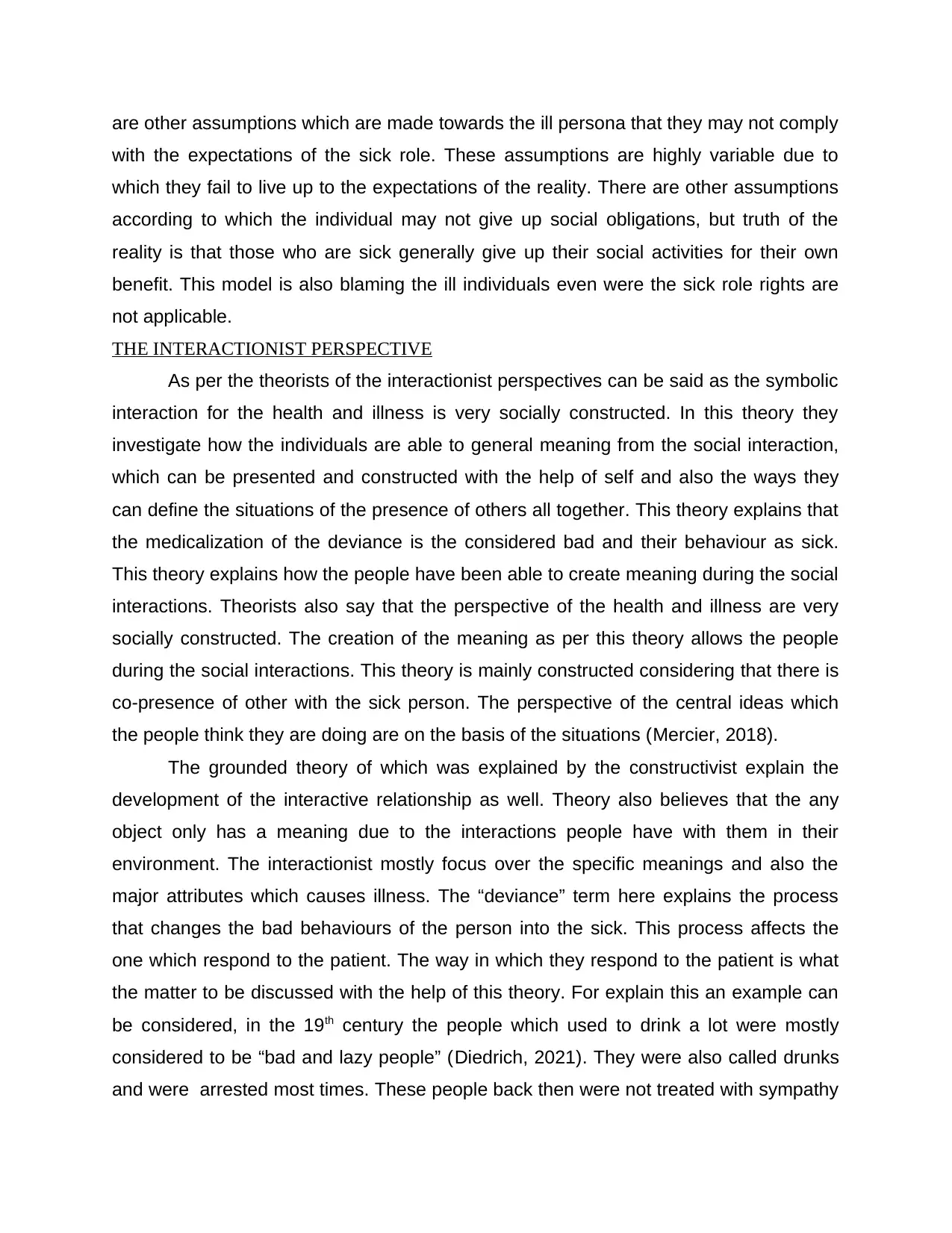
are other assumptions which are made towards the ill persona that they may not comply
with the expectations of the sick role. These assumptions are highly variable due to
which they fail to live up to the expectations of the reality. There are other assumptions
according to which the individual may not give up social obligations, but truth of the
reality is that those who are sick generally give up their social activities for their own
benefit. This model is also blaming the ill individuals even were the sick role rights are
not applicable.
THE INTERACTIONIST PERSPECTIVE
As per the theorists of the interactionist perspectives can be said as the symbolic
interaction for the health and illness is very socially constructed. In this theory they
investigate how the individuals are able to general meaning from the social interaction,
which can be presented and constructed with the help of self and also the ways they
can define the situations of the presence of others all together. This theory explains that
the medicalization of the deviance is the considered bad and their behaviour as sick.
This theory explains how the people have been able to create meaning during the social
interactions. Theorists also say that the perspective of the health and illness are very
socially constructed. The creation of the meaning as per this theory allows the people
during the social interactions. This theory is mainly constructed considering that there is
co-presence of other with the sick person. The perspective of the central ideas which
the people think they are doing are on the basis of the situations (Mercier, 2018).
The grounded theory of which was explained by the constructivist explain the
development of the interactive relationship as well. Theory also believes that the any
object only has a meaning due to the interactions people have with them in their
environment. The interactionist mostly focus over the specific meanings and also the
major attributes which causes illness. The “deviance” term here explains the process
that changes the bad behaviours of the person into the sick. This process affects the
one which respond to the patient. The way in which they respond to the patient is what
the matter to be discussed with the help of this theory. For explain this an example can
be considered, in the 19th century the people which used to drink a lot were mostly
considered to be “bad and lazy people” (Diedrich, 2021). They were also called drunks
and were arrested most times. These people back then were not treated with sympathy
with the expectations of the sick role. These assumptions are highly variable due to
which they fail to live up to the expectations of the reality. There are other assumptions
according to which the individual may not give up social obligations, but truth of the
reality is that those who are sick generally give up their social activities for their own
benefit. This model is also blaming the ill individuals even were the sick role rights are
not applicable.
THE INTERACTIONIST PERSPECTIVE
As per the theorists of the interactionist perspectives can be said as the symbolic
interaction for the health and illness is very socially constructed. In this theory they
investigate how the individuals are able to general meaning from the social interaction,
which can be presented and constructed with the help of self and also the ways they
can define the situations of the presence of others all together. This theory explains that
the medicalization of the deviance is the considered bad and their behaviour as sick.
This theory explains how the people have been able to create meaning during the social
interactions. Theorists also say that the perspective of the health and illness are very
socially constructed. The creation of the meaning as per this theory allows the people
during the social interactions. This theory is mainly constructed considering that there is
co-presence of other with the sick person. The perspective of the central ideas which
the people think they are doing are on the basis of the situations (Mercier, 2018).
The grounded theory of which was explained by the constructivist explain the
development of the interactive relationship as well. Theory also believes that the any
object only has a meaning due to the interactions people have with them in their
environment. The interactionist mostly focus over the specific meanings and also the
major attributes which causes illness. The “deviance” term here explains the process
that changes the bad behaviours of the person into the sick. This process affects the
one which respond to the patient. The way in which they respond to the patient is what
the matter to be discussed with the help of this theory. For explain this an example can
be considered, in the 19th century the people which used to drink a lot were mostly
considered to be “bad and lazy people” (Diedrich, 2021). They were also called drunks
and were arrested most times. These people back then were not treated with sympathy
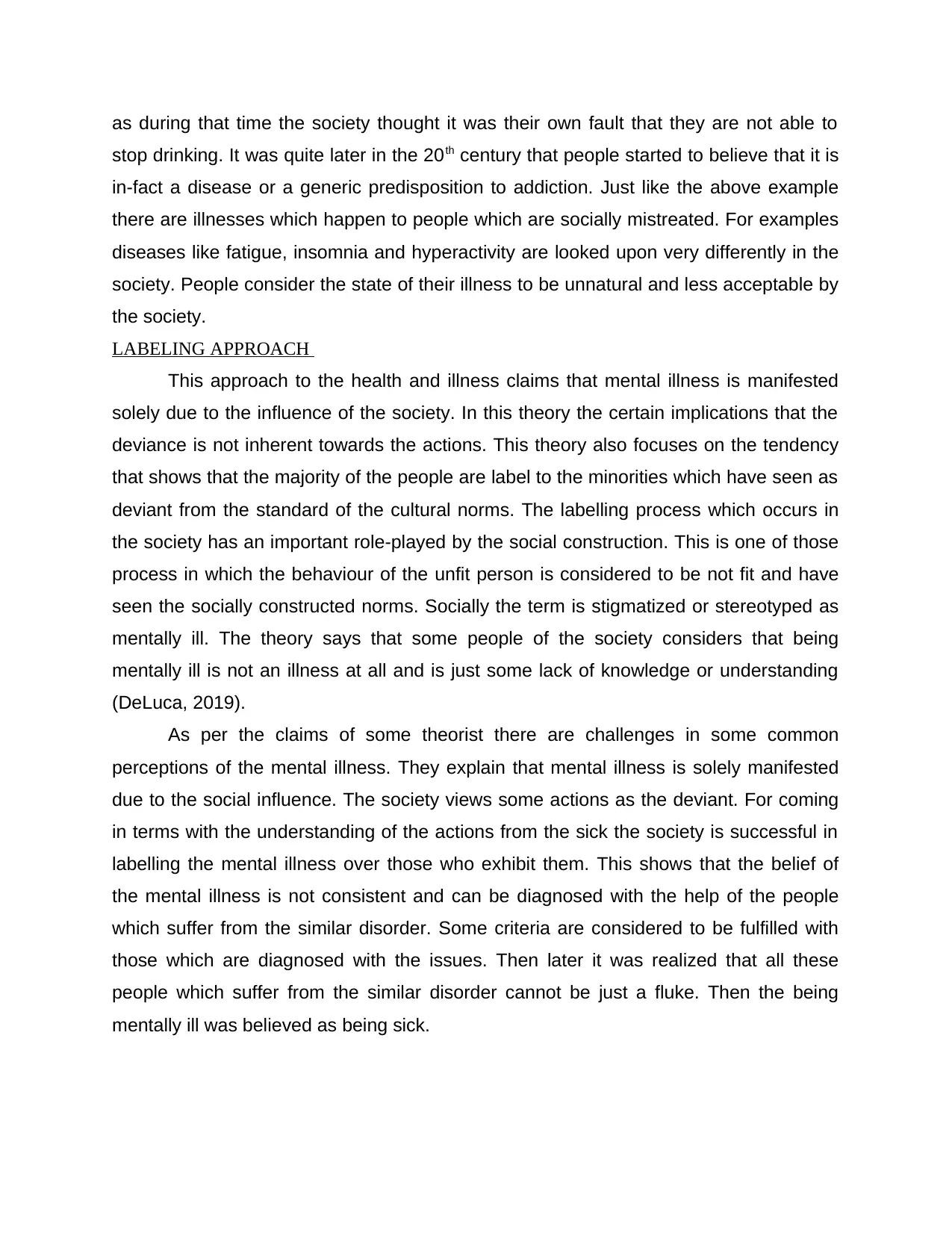
as during that time the society thought it was their own fault that they are not able to
stop drinking. It was quite later in the 20th century that people started to believe that it is
in-fact a disease or a generic predisposition to addiction. Just like the above example
there are illnesses which happen to people which are socially mistreated. For examples
diseases like fatigue, insomnia and hyperactivity are looked upon very differently in the
society. People consider the state of their illness to be unnatural and less acceptable by
the society.
LABELING APPROACH
This approach to the health and illness claims that mental illness is manifested
solely due to the influence of the society. In this theory the certain implications that the
deviance is not inherent towards the actions. This theory also focuses on the tendency
that shows that the majority of the people are label to the minorities which have seen as
deviant from the standard of the cultural norms. The labelling process which occurs in
the society has an important role-played by the social construction. This is one of those
process in which the behaviour of the unfit person is considered to be not fit and have
seen the socially constructed norms. Socially the term is stigmatized or stereotyped as
mentally ill. The theory says that some people of the society considers that being
mentally ill is not an illness at all and is just some lack of knowledge or understanding
(DeLuca, 2019).
As per the claims of some theorist there are challenges in some common
perceptions of the mental illness. They explain that mental illness is solely manifested
due to the social influence. The society views some actions as the deviant. For coming
in terms with the understanding of the actions from the sick the society is successful in
labelling the mental illness over those who exhibit them. This shows that the belief of
the mental illness is not consistent and can be diagnosed with the help of the people
which suffer from the similar disorder. Some criteria are considered to be fulfilled with
those which are diagnosed with the issues. Then later it was realized that all these
people which suffer from the similar disorder cannot be just a fluke. Then the being
mentally ill was believed as being sick.
stop drinking. It was quite later in the 20th century that people started to believe that it is
in-fact a disease or a generic predisposition to addiction. Just like the above example
there are illnesses which happen to people which are socially mistreated. For examples
diseases like fatigue, insomnia and hyperactivity are looked upon very differently in the
society. People consider the state of their illness to be unnatural and less acceptable by
the society.
LABELING APPROACH
This approach to the health and illness claims that mental illness is manifested
solely due to the influence of the society. In this theory the certain implications that the
deviance is not inherent towards the actions. This theory also focuses on the tendency
that shows that the majority of the people are label to the minorities which have seen as
deviant from the standard of the cultural norms. The labelling process which occurs in
the society has an important role-played by the social construction. This is one of those
process in which the behaviour of the unfit person is considered to be not fit and have
seen the socially constructed norms. Socially the term is stigmatized or stereotyped as
mentally ill. The theory says that some people of the society considers that being
mentally ill is not an illness at all and is just some lack of knowledge or understanding
(DeLuca, 2019).
As per the claims of some theorist there are challenges in some common
perceptions of the mental illness. They explain that mental illness is solely manifested
due to the social influence. The society views some actions as the deviant. For coming
in terms with the understanding of the actions from the sick the society is successful in
labelling the mental illness over those who exhibit them. This shows that the belief of
the mental illness is not consistent and can be diagnosed with the help of the people
which suffer from the similar disorder. Some criteria are considered to be fulfilled with
those which are diagnosed with the issues. Then later it was realized that all these
people which suffer from the similar disorder cannot be just a fluke. Then the being
mentally ill was believed as being sick.
⊘ This is a preview!⊘
Do you want full access?
Subscribe today to unlock all pages.

Trusted by 1+ million students worldwide
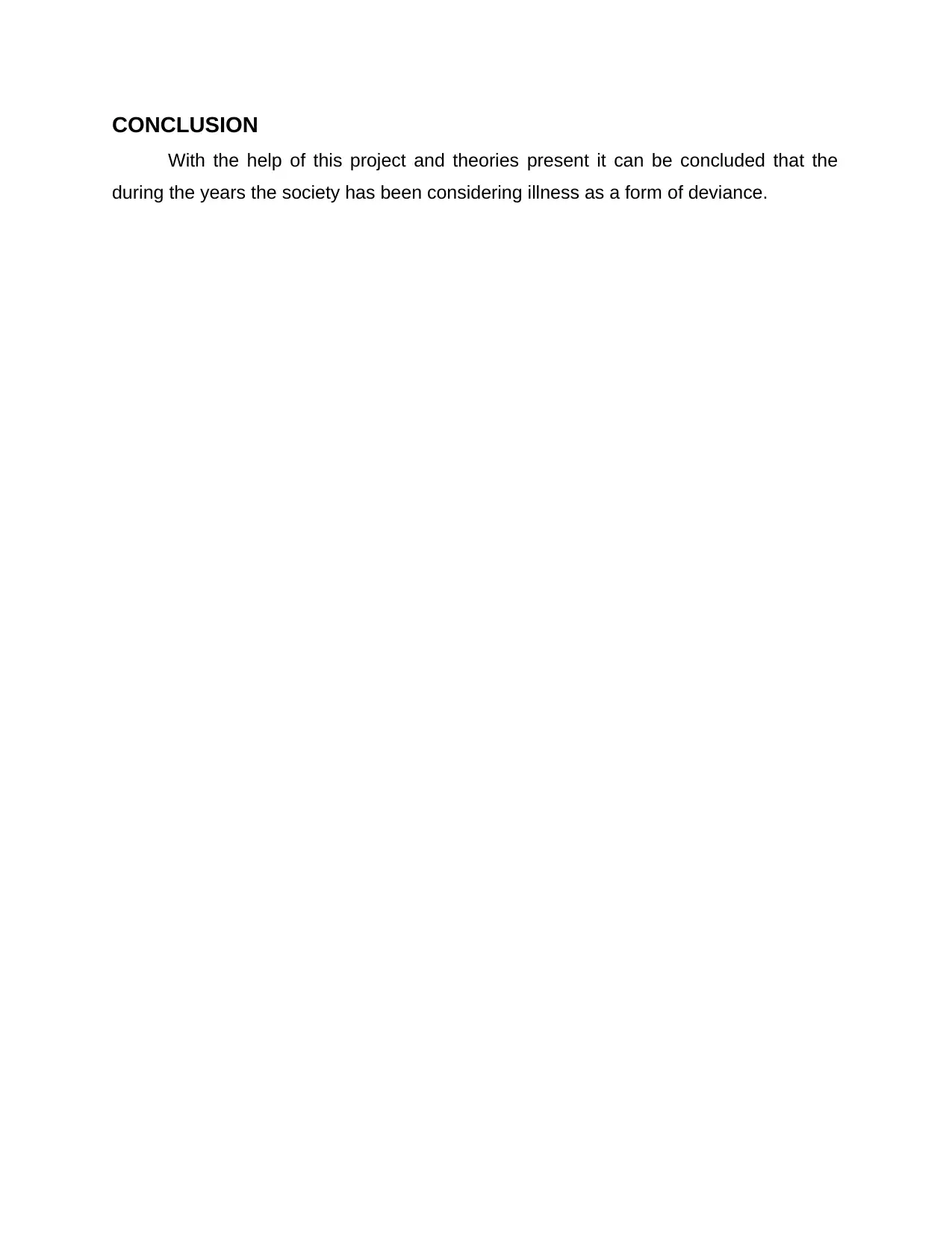
CONCLUSION
With the help of this project and theories present it can be concluded that the
during the years the society has been considering illness as a form of deviance.
With the help of this project and theories present it can be concluded that the
during the years the society has been considering illness as a form of deviance.
Paraphrase This Document
Need a fresh take? Get an instant paraphrase of this document with our AI Paraphraser
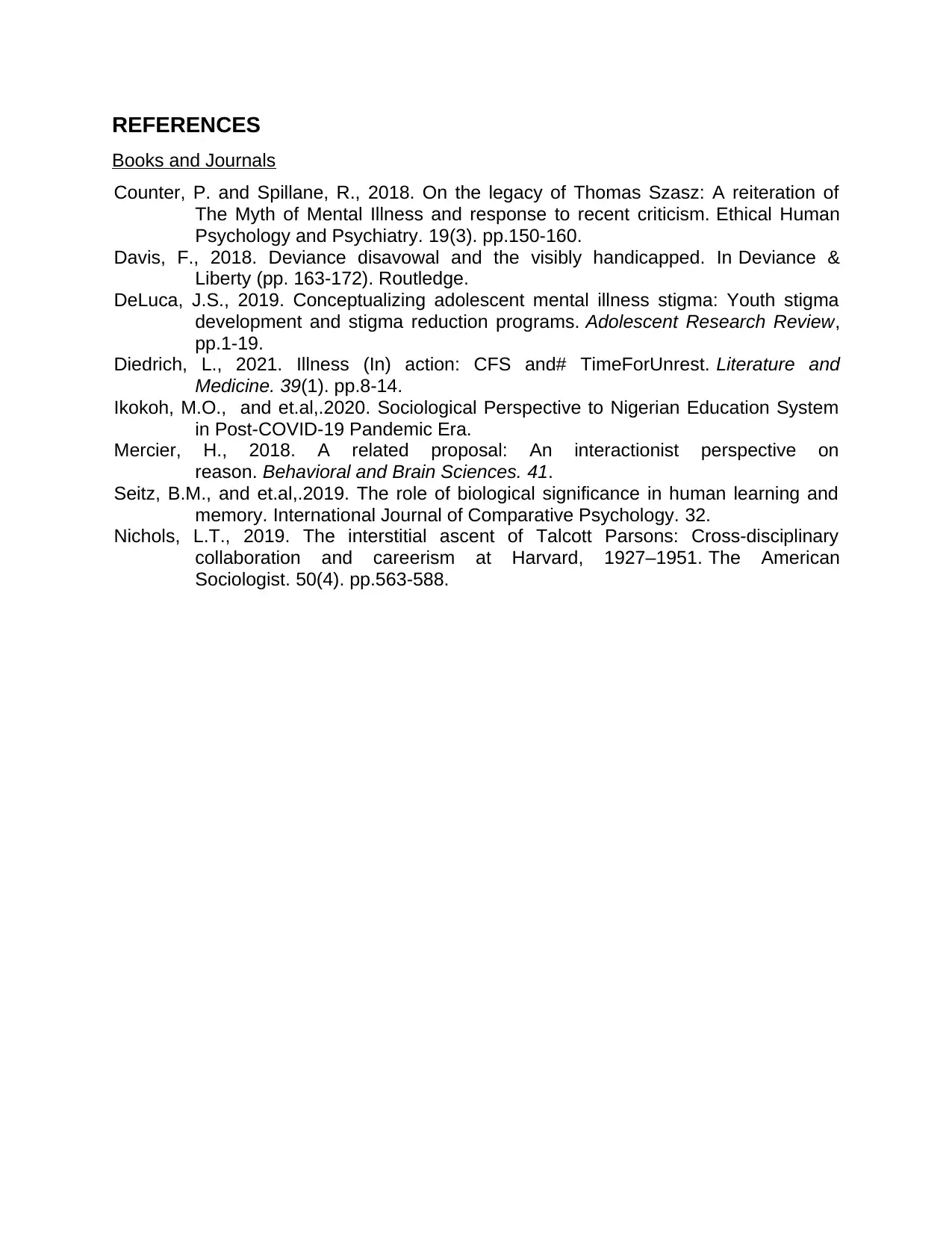
REFERENCES
Books and Journals
Counter, P. and Spillane, R., 2018. On the legacy of Thomas Szasz: A reiteration of
The Myth of Mental Illness and response to recent criticism. Ethical Human
Psychology and Psychiatry. 19(3). pp.150-160.
Davis, F., 2018. Deviance disavowal and the visibly handicapped. In Deviance &
Liberty (pp. 163-172). Routledge.
DeLuca, J.S., 2019. Conceptualizing adolescent mental illness stigma: Youth stigma
development and stigma reduction programs. Adolescent Research Review,
pp.1-19.
Diedrich, L., 2021. Illness (In) action: CFS and# TimeForUnrest. Literature and
Medicine. 39(1). pp.8-14.
Ikokoh, M.O., and et.al,.2020. Sociological Perspective to Nigerian Education System
in Post-COVID-19 Pandemic Era.
Mercier, H., 2018. A related proposal: An interactionist perspective on
reason. Behavioral and Brain Sciences. 41.
Seitz, B.M., and et.al,.2019. The role of biological significance in human learning and
memory. International Journal of Comparative Psychology. 32.
Nichols, L.T., 2019. The interstitial ascent of Talcott Parsons: Cross-disciplinary
collaboration and careerism at Harvard, 1927–1951. The American
Sociologist. 50(4). pp.563-588.
Books and Journals
Counter, P. and Spillane, R., 2018. On the legacy of Thomas Szasz: A reiteration of
The Myth of Mental Illness and response to recent criticism. Ethical Human
Psychology and Psychiatry. 19(3). pp.150-160.
Davis, F., 2018. Deviance disavowal and the visibly handicapped. In Deviance &
Liberty (pp. 163-172). Routledge.
DeLuca, J.S., 2019. Conceptualizing adolescent mental illness stigma: Youth stigma
development and stigma reduction programs. Adolescent Research Review,
pp.1-19.
Diedrich, L., 2021. Illness (In) action: CFS and# TimeForUnrest. Literature and
Medicine. 39(1). pp.8-14.
Ikokoh, M.O., and et.al,.2020. Sociological Perspective to Nigerian Education System
in Post-COVID-19 Pandemic Era.
Mercier, H., 2018. A related proposal: An interactionist perspective on
reason. Behavioral and Brain Sciences. 41.
Seitz, B.M., and et.al,.2019. The role of biological significance in human learning and
memory. International Journal of Comparative Psychology. 32.
Nichols, L.T., 2019. The interstitial ascent of Talcott Parsons: Cross-disciplinary
collaboration and careerism at Harvard, 1927–1951. The American
Sociologist. 50(4). pp.563-588.
1 out of 8
Related Documents
Your All-in-One AI-Powered Toolkit for Academic Success.
+13062052269
info@desklib.com
Available 24*7 on WhatsApp / Email
![[object Object]](/_next/static/media/star-bottom.7253800d.svg)
Unlock your academic potential
Copyright © 2020–2026 A2Z Services. All Rights Reserved. Developed and managed by ZUCOL.





